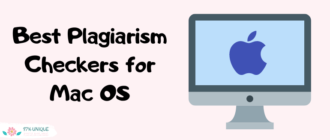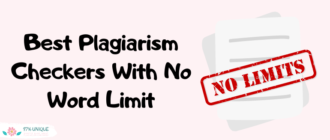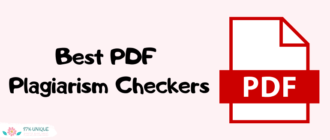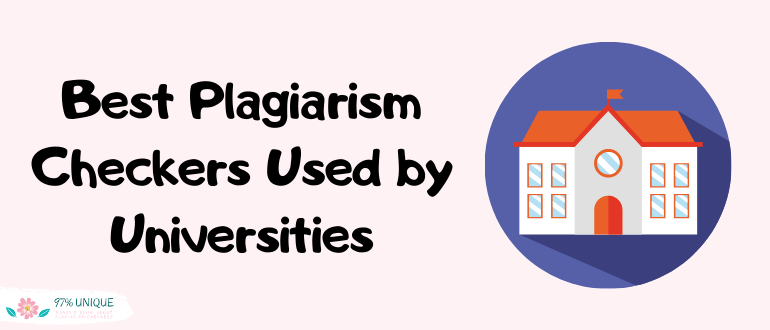
In the old days, plagiarism checkers simply checked for copy and pasted text. Now, nearly every checker used by universities uses extensive and in-depth technology to do so much more.
These tools are now capable of helping teachers grade and provide feedback and allow students to foster original thinking, among plenty of other abilities.
The question then becomes: which plagiarism checkers are worth your time and effort in checking the work of yourself or others?
I’ve tried out 27 different plagiarism checkers for this thorough guide and settled on eight ones worth trying out yourself. I’ve also decided not to include Plagiarisma and ProWritingAid.
So, in this handy guide, you’ll get:
- An overview of the best plagiarism checker features.
- A side-by-side comparison of checker formats and prices.
- A pros and cons list of each checker.
Now let’s help you find the answer to the question: What Is the Top Plagiarism Checker Used by Universities to Check Students’ Work?
| Acceptable formats | Features | Price |
|---|---|---|
| 1. Copyleaks ↓ | ||
| All plain text formats, Microsoft Word Docs, Acrobat, and HTML pages. |
|
Costs depend on the number of words you want checked per year. You can get 25 pages checked for free. After that, costs start at $8.99 per month. |
| 2. Unicheck ↓ | ||
| Any text format, .pdf, spreadsheet files, and compressed .zip files. |
|
Pricing starts at $5 per 20 pages with discounts provided in bulk. |
| 3. Turnitin ↓ | ||
| All file types. |
|
Colleges pay a base fee of $1,500 and an additional $3 per student. |
| 4. Grammarly ↓ | ||
| Microsoft Word Docs, Open Office, .txt and .rtf. |
|
$144 per year for individual use. Business use starts at $12.50 per member per month. |
| 5. Plagramme ↓ | ||
| Microsoft Word Docs, .pdf, .odt, .rtf, and .pages. |
|
Free for students and teachers and $5 per document for all others. |
| 6. Quetext ↓ | ||
| Microsoft Word Docs,.pdf, and plain text files. |
|
Has a free version and a premium version at $9.99 per month. |
| 7. Plagiarism Checker ↓ | ||
| Microsoft Word Docs, .rtf, .pdf, and plain text. |
|
There are three plans: Free, Professional, and Business. The Professional Plan has a one-time fee of $39.95, and The Business Plan costs $147.95 for groups. |
| 8. Ouriginal ↓ | ||
| All file types. |
|
You can request a quote. |
Let’s find out which one is best for your needs!
1. CopyLeaks
CopyLeaks starts off this list and is recognized for its extensive plagiarism detection.
The plagiarism checker has evolved over the years to encompass some of the best methods for detecting various forms of cheating, making it a trusted source for teachers around the globe.
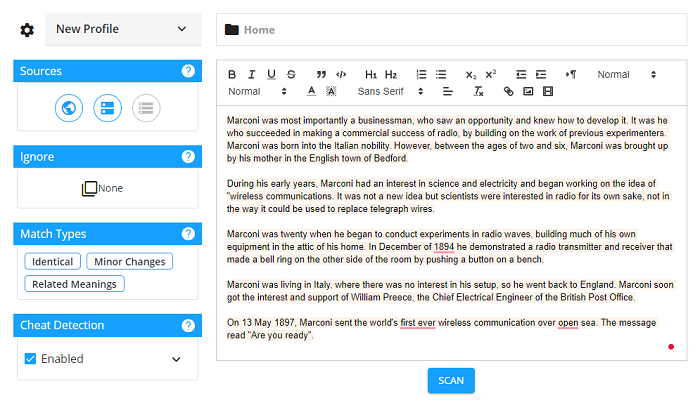
On the other hand, students will appreciate CopyLeaks’ guarantee of data privacy and security. They can rest assured that their work will not be copied from the program in any capacity.
I believe this is a highly important point, as many plagiarism checkers, unfortunately, keep student work.
Text length: The maximum text length allowed is 2,000 pages or 500,000 words, making it one of the most extensive plagiarism checkers, especially for research papers, which you can read more about here.
Acceptable formats: CopyLeaks accepts a number of formats, including Microsoft Word Docs, Acrobat, HTML pages, and many other text formats.
Database size: CopyLeaks owns a database of billions of web pages, open databases, and online journals.
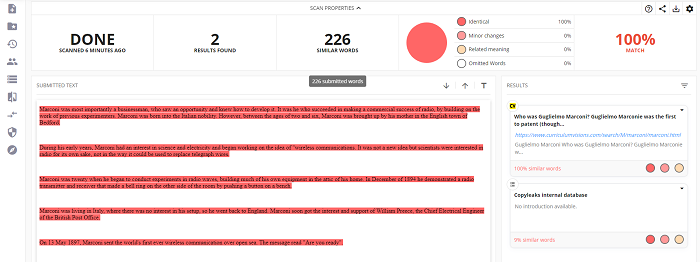
Pros:
- Available across the world in over 100 different languages.
- Has unparalleled data privacy and security protection, including Military-grade 256-bit encryption and SSL connection.
- Able to detect some of the most complex cheating methods, including “Hidden Text” and “Character Replacement.”
- Offers comprehensive reports on each work submitted.
- Lets you integrate your Learning Management System into the program in just 30 minutes.
Cons:
- The pricing system using credits can be confusing.
- Slow scanning time.
Price: The costs of CopyLeaks vary greatly. You can get 25 pages checked for free, but you will be charged starting at $8.99 a month after that. In fact, the highest costs go up to the $500 range for over 30 million words.
2. Unicheck
Unicheck is the only plagiarism checker used by universities on this list that emphasizes that its functions are available to users with disabilities.
I think this makes it particularly unique, as does its AI assistant named “Emma.” Emma can inform teachers as to whether students have paid for their papers, a rare function in plagiarism detection software.
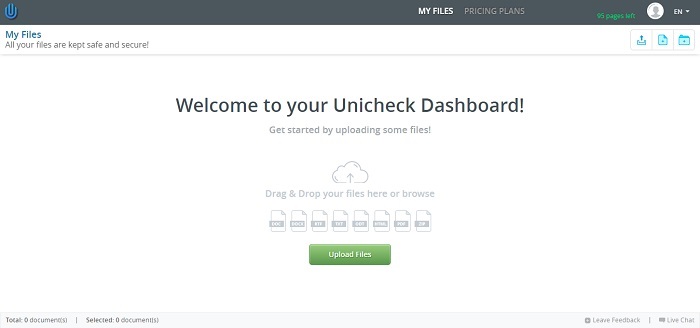
She can also help students by providing feedback on how to take a more personal approach to their writing.
Finally, Unicheck undergoes constant software performance checks by staff to ensure it can perform swift service for its users.
Text length: Unicheck lets you check up to 125,000 words or about 454 pages. For further reference, a page usually has about 275 words.
Acceptable formats: Accepts .pdf files, spreadsheet files, compressed .zip files, among plain text files.
Database size: Unicheck holds an impressive 91 billion web sources and open-access databases.
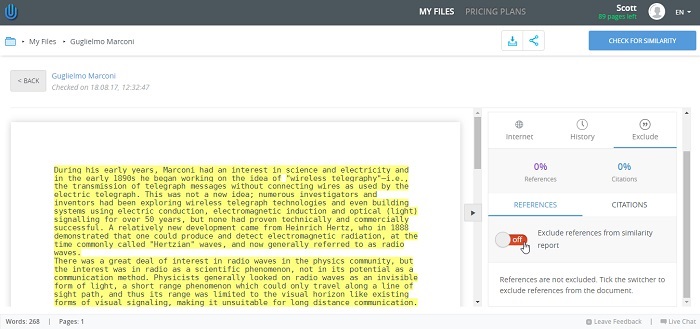
Pros:
- Unicheck can check papers at a swift 25 seconds per page.
- Gives you a side-by-side comparison of text that is plagiarized compared to the original document.
- There is no scanning delay during busy times, including midterms and finals.
- No extra charges if you want to migrate your Learning Management Software system.
- Multiple ways to contact support.
Cons:
- No mobile app available for use.
- Online only, meaning no offline function in case you don’t have internet.
Price: Pricing is straightforward with Unicheck, starting at $5 per 20 pages, with discounts provided for larger, bulk work.
3. Turnitin
Turnitin is perhaps the most known name on this list and one of my favorites. In fact, I’ve used Turnitin multiple times throughout my own academic career.
Used by over half of U.S. universities, this plagiarism checker indicates that it revolves around academic integrity and original thinking over all else.
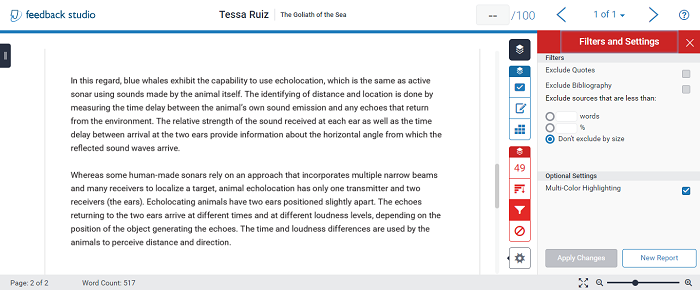
It certainly provides the tools to do so, with features that do much more than check for copied material.
This is an especially useful checker for teachers, who can not only grade papers through the service but provide high-grade feedback. In doing so, Turnitin sticks to its promise to uphold integrity and academic honesty.
Text length: Turnitin will take up to 800 pages.
Acceptable formats: This plagiarism checker accepts any file type.
Database size: Turnitin includes 200 million archived student papers, 17 billion web pages, and 90,000 journals, periodicals, and books. Turnitin has faced controversy for its archiving of student work, though many other plagiarism checkers do the same.
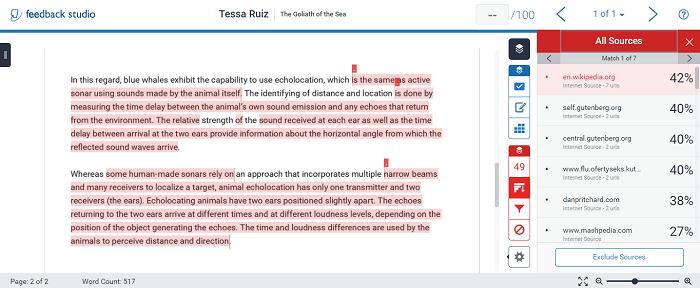
Pros:
- Widely used and trusted by thousands upon thousands of universities.
- The grading system is top-notch, allowing teachers to leave text or voice comments across student work.
- Can detect missing citations.
- Teachers can see student progress on their work through visual charts.
- Keeps up with the latest trends in student work cheating.
Cons:
- For colleges only with no individual or business use.
- More expensive than competitors.
Price: The average price for universities using Turnitin is $1,500 for a base fee plus $3 per student.
4. Grammarly
Grammarly has gained great popularity in recent years for both teachers and students alike.
What I love about the software is that not only can Grammarly detect plagiarism, but it also helps with grammar, spelling, clarity, tone, and many other aspects of writing.
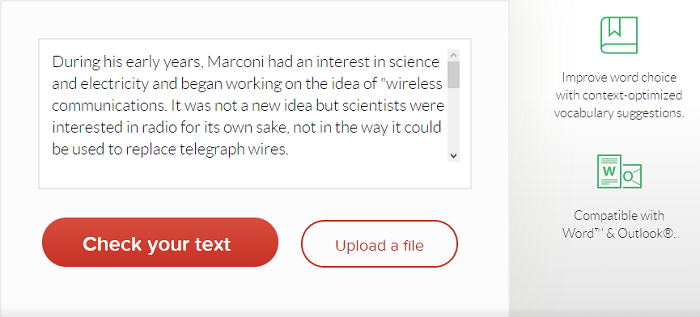
Having these online learning tools is invaluable for students during their years at university.
YouTuber Jack Edwards outlines how to master the art of the college essay in his video, “PLAN and RESEARCH a 2,000 word essay with me at university (how to write first-class essays),” giving even more actionable essay tips that students can use on the Grammarly platform.
Even better, Grammarly is available as a browser extension for Safari, Chrome, Firefox, and Google Docs, so you don’t even have to use the program directly.
Text length: Grammarly is different in that it splits up its text length depending on which format you use. If you use the general Grammarly editor, you can submit up to 100,000 words. On the other hand, if you use Microsoft for Mac, you can check 150,000 words.
Acceptable formats: Grammarly accepts Microsoft Word Docs, Open Office, .rtf, and normal text formats.
Database size: Grammarly has a database of 16 billion web pages.
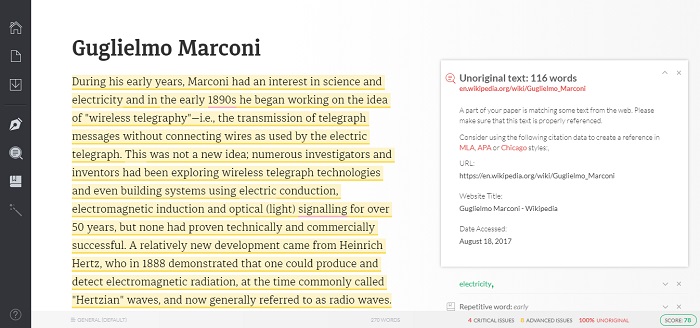
Pros:
- Helps students vastly improve their writing abilities with the premium version’s grammar helper.
- Can show both teachers and students the original plagiarized source.
- No work is ever kept by Grammarly.
- No limits as to who can use the program.
- Very high accuracy compared to other plagiarism checkers online.
Cons:
- Some grammar suggestions aren’t always accurate.
- No free trial.
Price: One downside of Grammarly is that the plagiarism checker is only available for premium users. Premium users pay $144 annually for individual use, or businesses pay $12.50 per member per month.
5. Plagramme
Plagramme is lesser-known but still just as effective as a plagiarism checker. In fact, it has an impressive 4.7 average on Trustpilot, making it one of the most customer-satisfying plagiarism checkers.
You can also start using the plagiarism checker for free without signing up, which makes it one of the quickest and most efficient checkers on the market.
At the same time, I have to say that the free version is much more limited to the premium version, meaning it may be best to shell out some cash after a few tries with this checker.
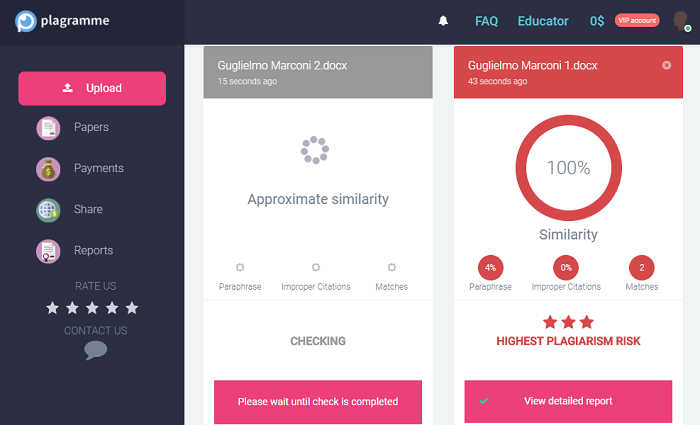
Still, some of the best features of this software can be found in its detection capabilities, which can even detect copied-and-pasted retweets, among many other copying techniques.
Its handy scoring system also makes it much easier to understand what has been plagiarized and what hasn’t been.
Text length: Plagramme is one of the plagiarism checkers that has no text limits.
Acceptable formats: Acceptable text formats on Plagramme include Microsoft Word Docs, .pdf, .odt, .rtf, and .pages.
Database size: 80 million academic articles.
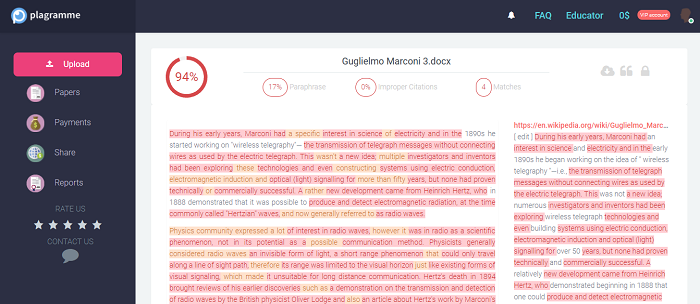
Pros:
- Available in over a highly impressive 120 languages.
- In-depth scoring system to show plagiarism matches.
- Differentiates between appropriate and inappropriate citations.
- Free for all educators and students alike.
- Has an extensive and professional database to check from.
Cons:
- Used with Windows only, limiting its scope of users.
- More on the expensive side.
Price: Free for teachers and students, $5 per document for all other users.
6. Quetext
If you want to go for ease of use, opt for plagiarism checker Quetext. Quetext may be easy to use, but it also offers some of the most intricate plagiarism detection software.
To be more specific, it uses “DeepSearch Technology” to give a contextual analysis of all work uploaded to the system. Even more useful is its ColorGrade Feedback capability to show both exact and “fuzzy” matches of other work.
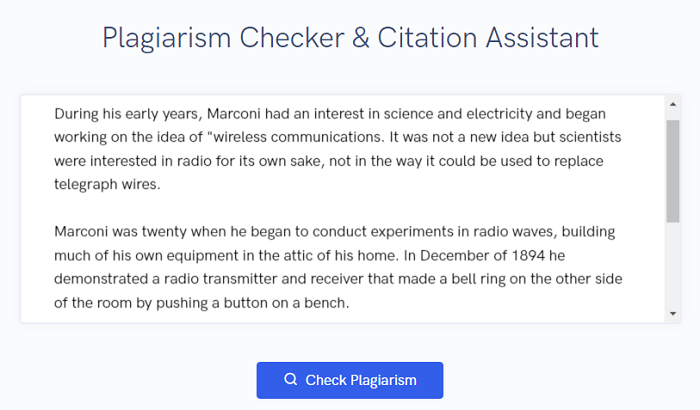
This is useful for students because oftentimes, there is subconscious, accidental plagiarism that occurs.
If you’re a student who needs help in this department, you can check out YouTube user Kenji Tomita’s video “How I got a First Class in EVERY Essay at University (Part 1) | The Best Essay Technique.” Kenji gives plenty of tips on how to research effectively.
Text length: Quetext is free to use as a plagiarism checker for up to 2500 words. The pro version increases the word count to 100,000 words.
Acceptable formats: You can upload .pdf, Microsoft Word Docs, and plain text files onto the plagiarism checker.
Database size: This database includes 20 million books, 35 billion web pages, and over 1 million academic journals.
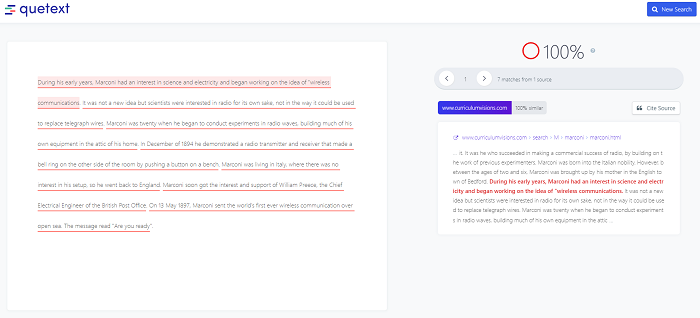
Pros:
- Unique plagiarism checking abilities.
- DeepSearch algorithm gives some of the most in-depth feedback of plagiarism checkers online.
- Create citations directly into your uploaded text.
- Work is never kept or sold to third parties.
- Offers a free version.
Cons:
- No grammar check.
- The free plan does not have a lot of features.
Price: Quetext offers a free version, though its paid version provides more capabilities, as is usually the case. The paid version is able to check many more words and is not too expensive at just $9.99 a month.
7. Plagiarism Checker X
Plagiarism Checker X is your go-to for speedy plagiarism checking. The program is able to check enormous amounts of work in just seconds.
In these few seconds, Plagiarism Checker X will check for text similarity and offer a comprehensive report on what it finds.
I also like that the program gives you a side-by-side view of what you may have copied.
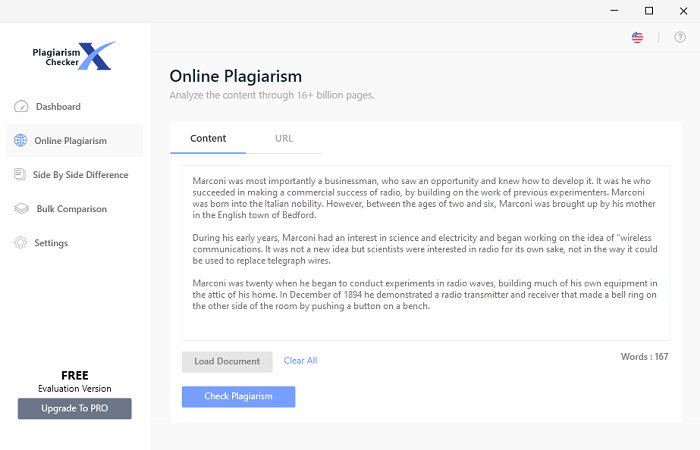
Teachers will also fall in love with the bulk comparison checker that can check a multitude of papers quickly and accurately.
No more hours spent checking reports one by one, allowing you to focus on more important aspects, like helping students improve their writing.
Text length: Like Plagramme, Plagiarism Checker X does not impose any text limits.
Acceptable formats: Teachers and students alike can upload Microsoft Word Docs, .rtf, .pdf, and plain text.
Database size: There are 16 billion resources in Plagiarism Checker X’s database.
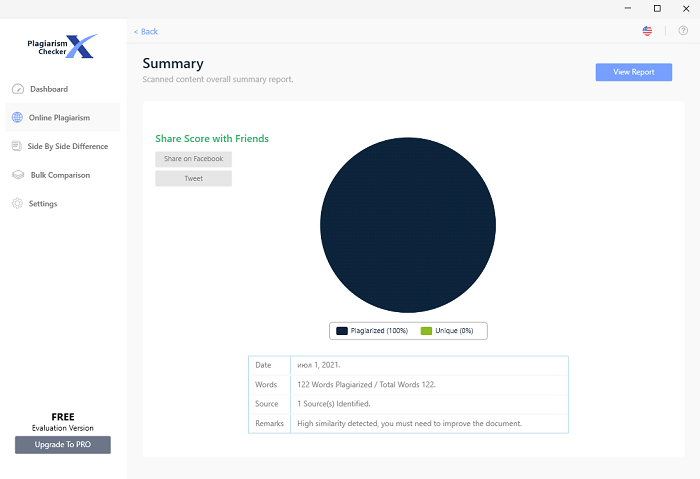
Pros:
- Supported across over 80 countries, making it widely accessible.
- Also available in seven different languages, including English, Spanish, French, German, Italian, Dutch, and Portuguese.
- Side-by-side comparison makes comparing works easy.
- One of the quickest yet most effective scanners.
- Also offers many other plagiarism checking tools for professional writers.
Cons:
- Only available for Windows.
- Slow scanning process.
Price: Plagiarism Checker X allows you to choose between three plans, including one that is free and two others that are paid. The paid Professional Plan includes a one-time fee of $39.95 and a Business Plan charging $147.95 for groups.
8. Ouriginal
Ouriginal uses both Urkund and PlagScan to scan potentially plagiarised all sorts of documents, including narrative literature reviews, which you can read more about in this article.
I like Ouriginal for its deep analysis yet simple reports on plagiarized content. The number of integrations Ouriginal uses is also pretty impressive, including Moodle, Canvas, and Blackboard.
The plagiarism checker is also notable for its “fewer false positives” guarantee, which makes its accuracy in detecting actual plagiarized work as error-free as possible.

You can rest assured that whether you’re a student or a teacher, you will be receiving an accurate report.
The one aspect I want to point out is that Ourginial is not fully transparent on its maximum text length or pricing, which I think can be detrimental in decision-making.
Text length: Ouriginal does not list its text limit on its site.
Acceptable formats: All file types.
Database size: Ourginial has millions of resources in its database.
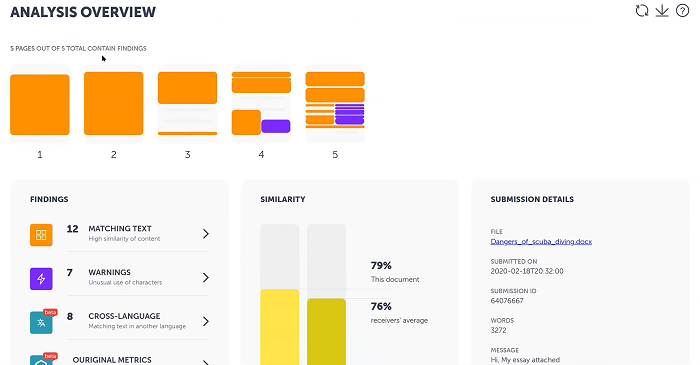
Pros:
- The number of integrations is substantial compared to its competitors.
- Analysis reports are color-coded for easy reference.
- One of the most accurate plagiarism checkers on the market.
- Straightforward and easy to use.
- Able to check plagiarism across languages.
Cons:
- Doesn’t list pricing on its site — must request a quote.
- Also doesn’t state its maximum text length.
Price: A notable downside to Ourginial is the lack of pricing on its website. You must request a quote, which can be frustrating if you need to make a quick decision.
Useful Resources
- Consequences of plagiarism for students, academics, and professionals
- Best National University rankings | US
- What do colleges look for in admissions?
- 10 great ways to win a college scholarship
Conclusion
So there you have it — the best plagiarism checker used by universities. Let me know in the comments below which one you’re using and why you’ve chosen it 
You can also learn more about the best plagiarism checking options for students in this article. While all of these plagiarism checkers differ in what they offer, they all provide you with a great choice for you to check your work or the work of others!


